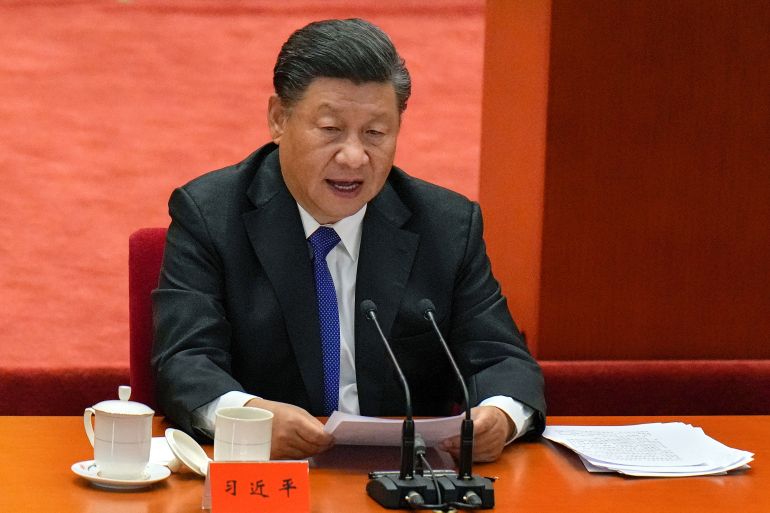China’s Xi calls on nations to secure global supply chains
Leader of world’s No. 2 economy makes remarks amid preparations to secure unprecedented third term in power.

Chinese President Xi Jinping called on nations to secure global supply chains and prevent inflation shocks, as the leader of the world’s No.2 economy seeks a smooth path to clinching a precedent-defying third term in power.
“We need to resolve various risks and promote the steady recovery of the world economy,” Xi said at the World Economic Forum via video link on Monday, the third time the Chinese leader has addressed the event.
Keep reading
list of 4 itemsIn Thailand, Myanmar exodus a lifeline for COVID-battered economy
As North Korea’s economy flounders, hints of easing isolation
US trade deficit narrows in October as exports jump
“The global industrial and supply chains have been disrupted,” he added. “Commodity prices continue to rise. Energy supply remains tight. These risks compound one another and heighten the uncertainty about the economic recovery.”
An energy crunch in China’s border nation Kazakhstan led to Russian troops being enlisted to help crush a public uprising earlier this month, bringing supply-chain risks to Beijing’s back door. China is seeking to minimize economic and diplomatic instability as Xi prepares to keep power at the ruling Communist Party’s leadership congress in the second half of this year.
Xi also warned about global inflation pressures and the resulting effects of higher interest rates.
“If major economies slam on the brakes or take a U-turn in their monetary policies, there would be serious negative spillovers,” he said. “They would present challenges to global economic and financial stability, and developing countries would bear the brunt of it.”
On China’s economy, Xi downplayed concerns even after data Monday showed growth slowed to 4% last quarter, the weakest pace since early 2020.
“The fundamentals of the Chinese economy are unchanged — it remains resilient, has sufficient potential and its long-term prospects are positive,” he said.
‘Economic challenges are real’
Angela Mancini, partner at Control Risks Group Pte in Singapore, told Bloomberg TV on Tuesday morning that Xi avoided spelling out for a global audience the risks confronting his government.
“While he’s touting China’s economic growth, and indeed it did have over 8% growth last year, that growth is slowing and the economic challenges are real for China,” she said.
“And they have demographic challenges as well and they’re trying to drive a zero-Covid policy,” she added. “They actually have quite a lot of challenges that he probably doesn’t want to highlight too aggressively in a speech like that.”
Xi called for coordination on global economic policy, just as China and U.S. diverge on key policy steps. China’s central bank cut interest rates for the first time in almost two years on Monday, while the U.S. Federal Reserve has signaled rate hikes in coming months.
“We should coordinate the targets, intensity and rhythm of fiscal and monetary policies and major developed countries should control the spillover effects of their policies to avoid shocks to developing countries,” Xi said.
Indian Prime Minister Narendra Modi and German Chancellor Olaf Scholz are also slated to speak at the virtual event that runs Jan. 17-21. While the summit usually draws the global elite to the Swiss ski resort of Davos for a week of schmoozing, it has shifted online for the past two years due to pandemic restrictions.
Xi became the first Chinese head of state to address the forum in 2017, days before Trump’s inauguration as U.S. president. At the time, he warned against a trade war and condemned protectionism, only for Beijing to become embroiled in a tariff spat with Washington.
Last year, Xi used the WEF to call on the world to shun an “outdated Cold-War mentality” as he signaled that China will forge its own path regardless of Western criticism, setting the tone for Beijing’s relationship with the Biden administration.
Xi also reaffirmed Monday that China welcomed “legal” foreign investment, sending a positive signal to investors after a year of punishing crackdowns on sectors including big tech, education and entertainment.
“All types of capital are welcome to operate in China in compliance with laws and regulations and play a positive role for the development of the country,” Xi said.